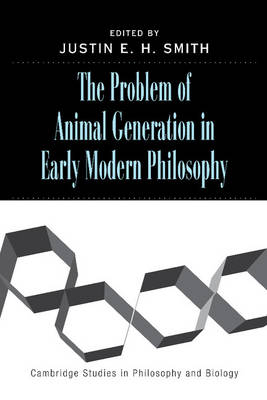
The Problem of Animal Generation in Early Modern Philosophy
Cambridge University Press (Verlag)
978-1-107-40728-2 (ISBN)
In this volume Smith examines the early modern science of generation, which included the study of animal conception, heredity, and fetal development. Analyzing how it influenced the contemporary treatment of traditional philosophical questions, it also demonstrates how philosophical pre-suppositions about mechanism, substance, and cause informed the interpretations offered by those conducting empirical research on animal reproduction. Composed of essays written by an international team of leading scholars, the book offers a fresh perspective on some of the basic problems in early modern philosophy. It also considers how these basic problems manifested themselves within an area of scientific inquiry that had not previously received much consideration by historians of philosophy.
Part I. The Dawning of a New Era: 1. The comparative study of animal development: from Aristotle to William Harvey J. G. Lennox; 2. Monsters, nature, and generation from the Renaissance to the Early Modern period: the emergence of medical thought Annie Bitbol-Hesperies; Part II. The Cartesian Programme: 3. Descartes' experiments and the generation of animals Vincent Aucante; 4. Imagination and the problem of heredity in Cartesian embryology Justin E. H. Smith; Part III. The Gassdendian Alternative: 5. The soul as vehicle for genetic information: Pierre Gassendi's account of inheritance Saul Fisher; 6. Atoms and minds in Walter Charleton's theory of animal generation Andreas Blank; Part IV. Second-Wave Mechanism and the Return of Animal Souls, 1650–1700: 7 Animal generation and substance in Sennert and Leibniz Richard T. W. Arthur; 8. Malebranche on animal generation: pre-existence and the microscope Andrew J. Pyle; 9. Spontaneous and sexual generation in Ann Conway's Principles Deborah Boyle; 10 'Animal' as category: Pierre Bayle's 'Rorarius' Dennis Des Chene; Part V. Between Epigenesis and Pre-Existence: The Debate Intensifies, 1700–70: 11. Method and cause: the Cartesian context of the Haller-Wolff debate Karen Detlefsen; 12. Soul power: G. E. Stahl and the debate on animal generation Francesco Paolo di Ceglia; 13. Charles Bonnet's neo-Leibnizian theory of organic bodies Francois Duchesneau; Part VI. Kant and His Contemporaries on Development and the Problem of Organized Matter: 14. Kant's early views on epigenesis: the role of Maupertuis John Zammito; 15. Blumenbach and Kant on the formative drive: mechanism and teleology in nature Brandon Look; 16. Kant and the speculative sciences of origins Catherine Wilson; 17. Kant and evolution Michael Ruse.
| Erscheint lt. Verlag | 13.9.2012 |
|---|---|
| Reihe/Serie | Cambridge Studies in Philosophy and Biology |
| Verlagsort | Cambridge |
| Sprache | englisch |
| Maße | 152 x 229 mm |
| Gewicht | 630 g |
| Themenwelt | Geisteswissenschaften ► Philosophie ► Geschichte der Philosophie |
| Geisteswissenschaften ► Philosophie ► Philosophie der Neuzeit | |
| Naturwissenschaften ► Biologie ► Evolution | |
| ISBN-10 | 1-107-40728-1 / 1107407281 |
| ISBN-13 | 978-1-107-40728-2 / 9781107407282 |
| Zustand | Neuware |
| Informationen gemäß Produktsicherheitsverordnung (GPSR) | |
| Haben Sie eine Frage zum Produkt? |
aus dem Bereich


